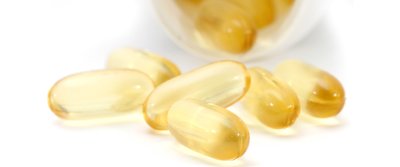If you've ever swum through supplement research, you've surely dipped a toe in the ocean of information surrounding fish oil. This little supplement has made waves, but should you dive headfirst into the fish fry? In a word, yes. In a bad joke, fish oil is off the hook!
It might sound silly, but there's nothing fishy about this incredible supplement. Care to know more? Then cast your line and get ready for school. I'll teach you the ins and outs of this popular dietary supplement.
Fatten Up
Fish oil contains essential fatty acids (EFAs) that have been shown to offer myriad benefits. Since they're the most widely researched and important, we'll focus here on two essential Omega 3 fatty acids: EPA and DHA.
These fatty acids are termed "essential" because we need them for proper function, but our bodies cannot produce them. Thus, we must obtain them through food or supplements.
While there are a number of EFA supplements, such as flax and other oils, fish oil is one of the finest sources available.
Who is Fish Oil For?
Fish oil supplements provide a wide variety of health benefits. Thus, they're incredibly useful for the general population and can help everyone from athletes to sedentary individuals.
Bodybuilders and physique athletes find fish oil intriguing due to potential body composition benefits, but almost anyone looking to support overall health may be interested in the fine fats from fish oil.

Think she means business? This girl supplements regularly with fish oil. Winning.
Science Class
As mentioned, fish oil's primary, active components are EPA and DHA. In the body, EPA and DHA can be stored in the phospholipid bilayer of cells for future use. If you consume enough EPA or DHA, you can significantly alter the composition of the fats that make up the bilayer of your cells. This can have a profound impact on processes that utilize those stored lipids (fats).
Of particular relevance is the anti-oxidant and acute, exercise-related anti-inflammatory nature of EPA and DHA. Since high-intensity exercise and weight training cause increases in inflammation and oxidation, reducing this response may be beneficial in improving exercise recovery. While it's emerging, the research has yet to fully examine this angle of EPA and DHA supplementation.
Perhaps more interesting for people looking to build muscle, EPA and DHA supplementation has been suggested to support muscle protein synthesis and limit muscle protein degradation. This can mean less muscle breakdown and more muscle growth.
Now bear with me, 'cuz I'm about to drop some algebra on you.
Muscle Math
The essential formula for gaining muscle is that the rate of lean tissue gain, or protein balance, is the rate of synthesis minus the rate of degradation. Since EPA and DHA can increase synthesis and decrease degradation, they can light both ends of the candle and help push the muscle-building balance in your favor!
Additionally, EPA and DHA have been suggested to support insulin function and increase glucose and fatty acid uptake into muscle cells. This may help partition nutrients toward muscle and away from fat, improving overall body composition and providing more fuel to the muscle during workouts.
EPA and DHA have also been suggested to increase cardiac output and stroke volume, which may help support healthy blood flow and possibly exercise performance, though this has not been examined directly.

EPA and DHA can light both ends of the candle and help push the muscle-building balance in your favor.
Get Fat
Different fish oil supplements have different concentrations of EPA and DHA. In order to gain the body composition and muscle metabolic benefits of these two fatty acids, make sure you consume around 2-4g of EPA & DHA combined every day.
There is some evidence that taking fish oil with meals may enhance the anabolic response to a meal. Additionally, taking fish oil with a meal may improve the fish oil's uptake, though this is personal speculation.
Fish oil—EPA in particular—has been shown to work synergistically with HMB for reducing muscle protein breakdown. Since EPA can enhance muscle protein synthesis, it may also be useful to take with leucine, BCAAs or whey protein, which also support muscle protein synthesis.
Of course, you can also stack fish oil with your usual foundational supplements (such as a multivitamin).
Going Fishing
As a rule, I recommend purchasing supplements from labels which can provide lab analysis of their products. This ensures that what's on the label is actually in the bottle.
Since most of the benefits from fish oil are from the EPA and DHA content, look for supplements which contain a high concentration of these fatty acids.
Fish oil is tolerated well by most people, though there are a few side effects that some people may experience. These include excessive bleeding if you take a very high dose of fish oil—far beyond what is recommended here. This is due fish oil's ability to break down blood clots in high concentrations.
A small percentage of people are allergic to fish oil and should not consume it.
Perhaps the most common side effect is gastrointestinal distress from fish oil consumption. Many people also experience unpleasant belching while taking fish oil capsules. If this is the case, try using a product that has enteric-coated capsules, which should reduce the incidence of gnarly fish oil burps.
As always, talk with your physician before starting any new supplement.
Fish Fry
Fish are an awesome source of essential fats, especially EPA and DHA. Unless you love daily deep-sea diving, a fish oil supplement is one of the best ways to get the multiple muscle-building and health benefits of essential fishy fats.
Fish Oil Options
More and more information is becoming available of just how important maintaining a regular intake of essential fatty acids is. Cast your line and catch some fish oil here on Bodybuilding.com.

